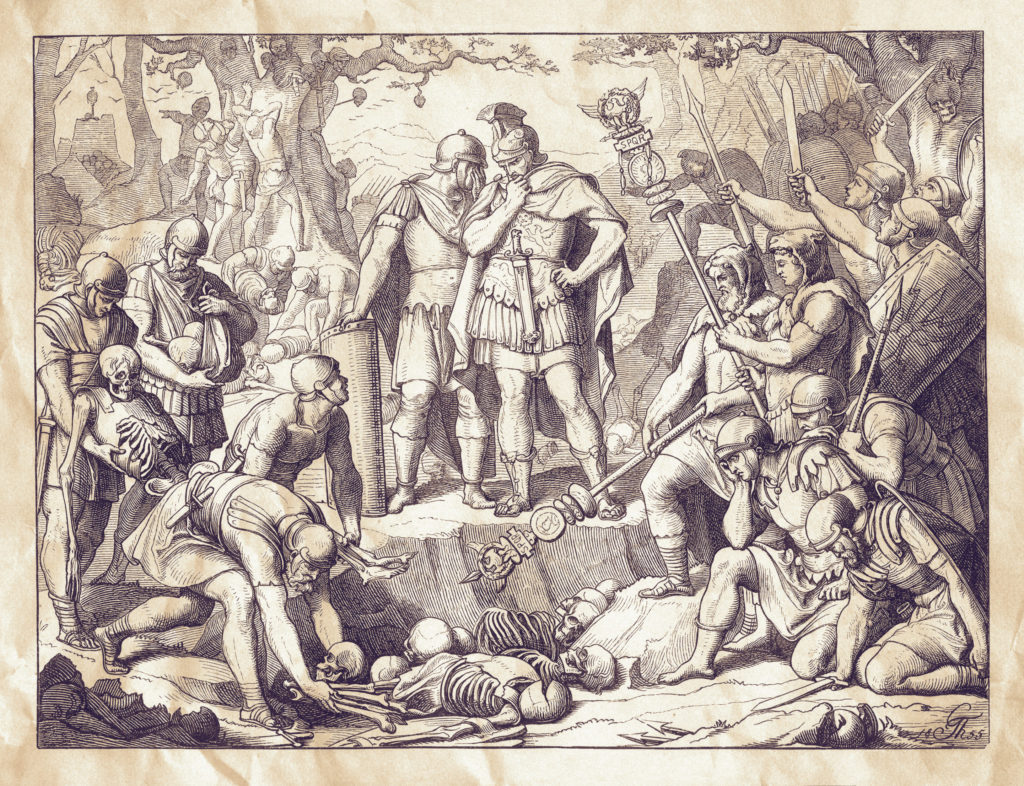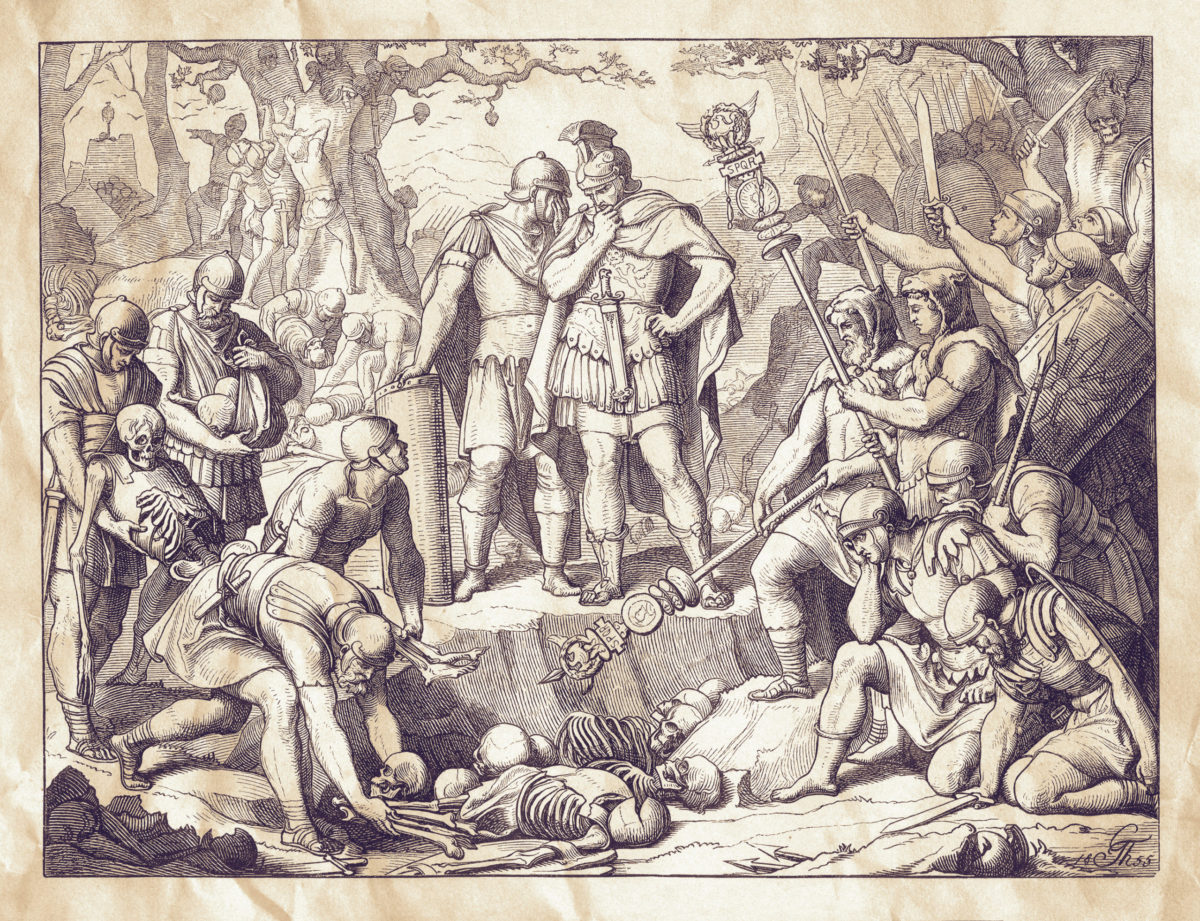“Varus! Give me back my legions!” shouted the enraged Roman Emperor Augustus according to ancient Roman historian Suetonius in The Twelve Caesars.
Augustus was raging against his losing commander in one of Rome’s greatest military defeats—the disastrous Battle of the Teutoburg Forest, c. September 9 CE. Publius Quinctilius Varus, governor of Rome’s Germania province (modern-day northwestern Germany) since 6 CE, known for favoring mass crucifixion as his preferred “crowd control” method, was tricked into leading three Roman legions (XVII, XVIII and XIX) plus six cohorts of Germanic tribesmen auxiliary troops and three cavalry squadrons—about 20,000 soldiers—into a fatal, days-long “ambush” by tens of thousands of Germanic warriors.
Formed primarily of four of the era’s 50 Germanic tribes (Cherusci, Bructeri, Marsi and Chatti), the trap was cleverly planned and orchestrated by a turncoat, Arminius (c. 17 BCE – 21 CE), a Cherusci tribesman prince and adopted Roman citizen. Varus’ legionaries, traveling in a thin column stretching from nine to 12 miles long, were encumbered by thousands of civilian camp followers who sloshed alongside them through the mud of the rain-soaked, dense forest bordered by swamps (near today’s Osnabrück, between the Ems and the Lippe Rivers).
The ambush struck Varus’ column when it was most vulnerable. The weather, terrain and the tribesmen’s fortified ambush positions robbed the three Roman legions of their usual keys to battlefield success: mobility, flexibility, and tactical cohesion. The Germanic warriors’ swords, long lances, axes and javelins annihilated Varus’ entire command within three days.
While a few Romans fled or escaped capture, all 20,000 were killed, ritually executed after capture, or enslaved. Senior Roman officers captured alive were singled out for gruesome tortures before execution. Many Roman commanders—notably Varus himself—chose suicide. The strategic result of the Battle of the Teutoburg Forest was that it permanently ended Rome’s northeastward expansion at the Rhine-Danube River barrier, altering Europe’s future development. British historian and military theorist J.F.C. Fuller wrote that, had the battle not occurred and failed to stop Rome’s expansion [eastward to the Elbe River, possibly beyond]: “The whole course of our history would have been different…There would have been no Franco-German problem…no Charlemagne, no Napoleon, no Kaiser William II, and no Hitler.” After losing Varus and his legions, Roman leaders had no intention of expending further efforts in blood and treasure trying to expand northern European dominions east of the Rhine.
But the Romans would have their revenge.
This excerpt from The Annals of Tacitus, written by famed Roman historian Publius Cornelius Tacitus and translated by Alfred John Church and William Jackson Brodribb in 1906, recounts what happened when Germanicus Julius Caesar (Emperor Tiberius’ adopted son) marched into Germany to avenge the honor of the empire.
The Roman soldiers make a gruesome discovery—the remains of Varus and his legions. At a time when forensics were nonexistent, we witness the Romans trying to piece together their own past by using eyewitnesses and examining the terrain. Because they lacked the technology we now benefit from, the Romans were unable to identify skeletal remains. In a particularly moving passage, Tacitus describes how this lack of closure added to their sense of agony—and also fueled their desire for retribution.
Ironically, while seeking revenge, veteran Roman commander Aulus Caecina Severus nearly falls prey to the same fate as Varus. In a truly chilling passage, the Germans stalk Caecina through the woods near the Rhine as he suffers from gruesome nightmares of the slain Varus trying to pull him into a swamp, and his men began to lose their nerve.
Arminius—the executioner of Varus and his legions—is circling them and seems to take sadistic pleasure in waiting for the dark forest to take its psychological toll on the Romans before moving in for the kill. But Caecina—a veteran of 40 campaigns—isn’t going down so easily, and the Romans’ desperation to make it home alive proves stronger than their fear.
Read Tacitus’ account of what happened below.
Finding Varus’ Legions
Lucius Stertinius [Germanicus’ legate, a high-ranking Roman general] was dispatched by Germanicus with a flying column [in 15 CE] and routed the Bructeri [rebellious Germanic tribe in northwestern Roman Germania] as they were burning their possessions, found the eagle [standard] of the XIX legion which had been lost [along with XVII and XVIII Legions] with Varus.
The troops were then marched to the furthest frontier of the Bructeri, and all the country between the rivers Amisia [Ems River, emptying into the North Sea] and Luppia [Lippe River, a Rhine tributary] was ravaged, not far from the forest of Teutoburgium [Germany’s Teutoburg Forest], where the remains of Varus and his legions were said to lie unburied.

Germanicus upon this was seized with an eager longing to pay the last honor to those soldiers and their general, while the whole army present was moved to compassion by the thought of their kinsfolk and friends, and, indeed of the calamities of wars and the lot of mankind.
Having sent on Caecina [Aulus Caecina Severus, another of Germanicus’ legates] in advance to reconnoiter the obscure forest passes, and to raise bridges and causeways over the watery swamps and treacherous plains, they visited the mournful scenes, with their horrible sights and associations.
Varus’ first camp with its wide circumference and the measurement of its central space clearly indicated the handiwork of three legions. Further on, the partially fallen rampart and the shallow fosse [encircling moat] suggested the inference that it was a shattered remnant of the army which had there taken up a position.
In Grief and anger
In the center of the field were the whitening bones of men, as they had fled, or stood their ground, strewn everywhere or piled in heaps. Near, lay fragments of weapons and limbs of horses, and also human heads, prominently nailed to the trunks of trees. In the adjacent groves were the barbarous altars, on which they had immolated tribunes [military rank below legate and above centurion] and first-rank centurions [commanders of 80 and up to several hundred legionaries].
Some survivors of the disaster who had escaped from the battle or from captivity described how this was the spot where the officers fell, how yonder the eagles were captured, where Varus was pierced by his first wound, where too by the stroke of his own ill-starred hand he found for himself death [i.e., committed suicide]. They pointed out too the raised ground from which Arminius had harangued his army, the number of gibbets [execution gallows] for the captives, the pits for the living, and how in his exultation he insulted the standards and the eagles.
And so the Roman army now on the spot, six years after the [9 CE] disaster, in grief and anger, began to bury the bones of three legions, not a soldier knowing whether he was interring the relics of a relative or a stranger, but looking on all as kinsfolk and of their own blood, while their wrath rose higher than ever against the foe.
In raising the barrow [burial mound] Caesar [i.e., Germanicus Julius Caesar] laid the first sod, rendering thus a most welcome honor to the dead, and sharing also in the sorrow of those present…
The barbarians Return
Soon afterwards Germanicus led back his army to the Amisia, taking his legions by the fleet [ship transport on the Ems River], as he had brought them up. Part of the cavalry was ordered to make for the Rhine along the seacoast. Caecina, who commanded a division of his own, was advised…to pass Long Bridges [where extended causeways and bridges over otherwise impassable terrain existed] with all possible speed. This was a narrow road amid vast swamps…Around were woods on a gradual slope, which Arminius now completely occupied, as soon by a short route and a quick march he had outstripped [Roman] troops heavily laden with baggage and arms…
The barbarians attempted to break through the outposts and to throw themselves on the engineering parties, which they harassed, pacing around them and continually charging them. There was a confused din from the men at work and the combatants.
Everything alike was unfavorable to the Romans, the place with its deep swamps, insecure to the foot and slippery as one advanced, limbs burdened with coats of mail, and the impossibility of aiming their javelins amid the water. The Cherusci [another rebellious tribe], on the other hand, were familiar with fighting in fens [wetlands]; they had huge frames, and lances long enough to inflict wounds even at a distance.
Savage shouts and flickering fires
Night at last released the legions, which were now wavering, from a disastrous engagement. The Germans whom success rendered unwearied, without even then taking any rest, turned all the streams which rose from the slopes of the surrounding hills into the lands beneath [low-lying areas]. The ground being thus flooded and the completed portion of our works submerged, the soldiers’ labor was doubled…
This was Caecina’s 40th campaign as a subordinate or a commander, and with such experience of success and peril, he was perfectly fearless. As he thought over future possibilities, he could devise no plan but to keep the enemy within the woods, till the wounded and the more encumbered troops were in advance…
It was a restless night for different reasons, the barbarians in their festivity filling the valleys under the hills and echoing glens with merry song or savage shouts, while in the Roman camp were flickering fires, broken exclamations, and the men lay scattered along the entrenchments or wandered from tent to tent, wakeful rather than watchful.
A ghostly Nightmare
A ghastly dream appalled the general [Caecina]. He seemed to see Quinctilius Varus, covered with blood, rising out of the swamps, and to hear him, as it were, calling to him, but he did not, as he imagined, obey the call; he even repelled his hand, as he [Varus’ apparition] stretched it out to him.
At daybreak the legions, posted on the wings, from panic or perversity, deserted their position and hastily occupied a plain behind the morass. Yet Arminius, though free to attack, did not at the moment rush out on them. But when the baggage was clogged in the mud and in the fosses, the soldiers around it in disorder, the array of standards in confusion, everyone in selfish haste and all ears deaf to the word of command, he ordered the Germans to charge, exclaiming again and again, “Behold a Varus and legions once more entangled in Varus’ fate.”

As he spoke, he cut through the column with some picked men, inflicting wounds chiefly on the horses. Staggering in their blood on the slippery marsh, they shook off their riders…trampling on the fallen. The struggle was hottest around the eagles, which could neither be carried in the face of the storm of missiles, nor planted in the miry soil.
Caecina, while he was keeping up the battle, fell from his horse, which was pierced under him, and was being hemmed in, when the first legion threw itself in the way. The greed of the foe helped him, for they left the slaughter to secure the spoil, and the legions, towards evening, struggled onto open and firm ground.
A General’s Plea to stop deserters
Nor did this end their miseries. Entrenchments had to be thrown up, materials sought for earthworks, while the army had lost to a great extent their implements for digging earth and cutting turf. There were no tents for the rank and file, no comforts for the wounded. As they shared their food, soiled by mire or blood, they bewailed the darkness with its awful omen, and the one day which yet remained to so many thousand men.
It chanced that a horse, which had broken its halter and wandered wildly in fright at the uproar, overthrew some men against whom it dashed. Thence arose such a panic from the belief that the Germans had burst into the camp that all rushed to the gates…
Caecina, having ascertained that the alarm was groundless, yet being unable to stop or stay the soldiers by authority or entreaties or even by force, threw himself to the earth in the gateway, and at last an appeal to their pity, as they would have to pass over the body of their commander, closed the way. At the same moment the tribunes and centurions convinced them that it was a false alarm.
Having then assembled them at his headquarters, and ordered them to hear his words in silence, he [Caecina] reminded them of the urgency of the crisis. Their safety, he said, lay in their arms, which they must however use with discretion, and they must remain within the entrenchments till the enemy approached closer, in the hope of storming them; then there must be a general sortie; by that sortie the Rhine might be reached.
Whereas if they fled, more forests, deeper swamps, and a savage foe awaited them, but if they were victorious, glory and renown would be theirs. He dwelt on all that was dear to them at home, all that testified to their honor in the camp, without any allusion to disaster…
Fury And the Light of Day
There was as much restlessness in the German host with its hopes, its eager longings, and the conflicting opinions of its chiefs. Arminius advised that they should allow the Romans to quit their position and, when they had quitted it, again surprise them in swampy and intricate ground. Inguiomerus [a Cherusci leader and Arminius’ uncle], with fiercer counsels, heartily welcome to the barbarians, was for beleaguering the entrenchments in armed array, as to storm them would, he said, be easy, and there would be more prisoners and the booty unspoilt.
So at daybreak they trampled in the fosses, flung hurdles [logs or branches to help cross the moats] into them, seized the upper part of the breastwork, where the troops were thinly distributed and seemingly paralyzed by fear. When they were fairly within the fortifications, the signal was given to the [Roman] cohorts [units composed of multiple 80-man centuries], and the horns and trumpets sounded. Instantly with a shout and sudden rush, our men threw themselves on the German rear, with taunts, that here were no woods or swamps, but that they were on equal ground, with equal chances.
The sound of trumpets, the gleam of arms, which were so unexpected, burst with all the greater effect on the enemy, thinking only, as they were, of the easy destruction of a few half-armed men, and they were struck down, as unprepared for a reverse as they had been elated with success.
Arminius and Inguiomerus fled from the battle, the first unhurt [Arminius was assassinated six years later by rival tribal leaders], the other severely wounded. Their followers were slaughtered as long as our fury and the light of day lasted. It was not till night that the legions returned, and though more wounds and the same want of provisions distressed them, yet they found strength, healing, sustenance, everything indeed, in their victory.






